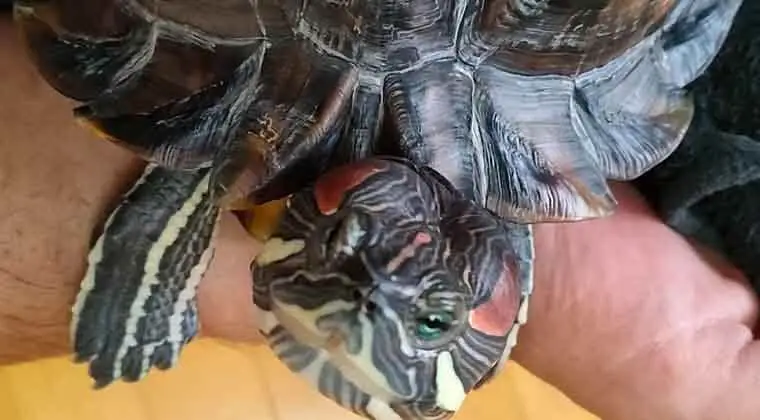Yes, turtles can eat cucumbers. Cucumbers are a healthy and nutritious food for turtles that provide vitamins, minerals, and fiber. They should be cut into small pieces to make them easier to consume and digest.
Turtles may also enjoy eating other vegetables like lettuce or carrots in addition to cucumber slices. It is important to not feed your turtle too much cucumber as it could cause digestive problems. Additionally, you should always wash the cucumber before feeding it to your pet turtle to ensure there are no harmful chemicals on its skin or inside the vegetable itself.
Can Turtles Eat Cucumber Skin?
Yes, turtles can eat cucumber skin! Cucumber is an excellent source of dietary fiber and vitamins, including vitamins A and C. The skin on the cucumber also provides beneficial nutrients such as potassium, magnesium, calcium, and iron. However, it should be noted that because the skin is a bit tough for turtles to chew through, you may want to peel or grate it before feeding it to your turtle.
Additionally, you should always wash fruits and vegetables intended for consumption by your pet before serving them to avoid any potential contamination from pesticides or other chemicals that may have been used during production.
Can Red Eared Sliders Eat Cucumber?
Yes, red eared sliders can eat cucumber! Cucumbers are a great source of vitamins and minerals for your turtle. They should be served raw in small pieces or slices to avoid choking hazards.
Additionally, you should remove any seeds before feeding as they may cause digestive issues. Feeding cucumbers is an excellent way to add variety to your slider’s diet and keep them healthy!
Do Turtles Eat Cucumber Skin?
Turtles can eat cucumber skin if it is cut into small pieces and the seeds removed. Some turtles may be picky about what they will eat, but most turtle species do enjoy a variety of foods that include cucumber skin. Cucumbers are an excellent source of vitamins, minerals, and fiber for turtles.
They contain vitamin A, which helps to support good vision in these animals, as well as potassium and calcium which help keep shells healthy by strengthening them. Additionally, they are low in fat and calories making them a great snack food choice for your pet turtle! However, it is important to remember not to feed too much or too often; moderation is key when feeding your pet any type of food item including vegetables like cucumbers with the skins on!
What Should You Not Feed Turtles?
Turtles are beloved pets, but unfortunately, they can be vulnerable to health issues if not cared for properly. One of the most important aspects of caring for a turtle is understanding their dietary needs and avoiding foods that are harmful or unhealthy. It’s important to know what you should and shouldn’t feed your pet turtle.
Generally, turtles prefer a diet consisting mainly of fish, insects, small amphibians, worms, and aquatic vegetation such as algae wafers or pellets. However there are some things that you absolutely should not feed them – processed human food like chips or candy, large chunks of raw meat (which could contain bacteria), live prey that may carry parasites and diseases; cabbage, spinach, or anything with high levels of oxalic acid; citrus fruits; dairy products; garlic/onions; avocados; nuts & seeds; chocolate – these can all pose serious health risks to your pet turtle so it’s best to avoid them altogether.
As long as you stick to natural meals appropriate for turtles and keep in mind what not to feed them then you will provide your pet turtle with a healthy diet full of nutrition!
Can a Tortoise Eat Cucumbers?
Yes, a tortoise can eat cucumbers! Many tortoises enjoy eating cucumbers as part of their diet. Cucumbers are rich in vitamins A and C, which are essential for good health and provide a great source of nutrition for your pet.
Additionally, the water content in cucumber helps to keep your tortoise hydrated. When feeding cucumber to your tortoise, make sure it is chopped into small pieces so they can easily digest it without any problems. You should also avoid giving them too much at once since an excess of anything can lead to digestive issues or even choking hazards.
To ensure that you’re providing the best care possible for your reptile friend, be sure to monitor how much they are consuming and consult with a vet if you have any concerns about their diet or overall health.
What Veggies Can Turtles Eat?
Turtles are omnivorous animals, which means they eat both meat and vegetation. When it comes to vegetables, there are a variety of veggies that can be offered to turtles as part of their diet. Carrots, turnips, squash, and sweet potatoes should all be cooked before being fed to your turtle; these provide important vitamins and minerals for the animal’s health.
Leafy greens like kale or bok choy can also be given in small amounts. Other veggies such as bell peppers, cucumbers, and tomatoes can occasionally be offered as treats but shouldn’t make up the majority of your turtle’s diet due to their high water content.
In addition to providing fresh veggies regularly, you may also want to offer commercial turtle pellets that contain additional nutrients. All in all, with proper care and nutrition turtles will thrive when provided with an appropriate diet that includes plenty of fruits and vegetables!
Do Pet Turtles Like To Eat Cucumbers? (Taste Test)
Conclusion
It is safe to say that turtles can indeed eat cucumbers. Cucumbers are a great food option for turtles as they contain essential vitamins and minerals needed in their diet.
Furthermore, they are low in fat and calories which makes them an ideal snack choice. Feeding your turtle cucumber regularly will help ensure a balanced diet and good health.
